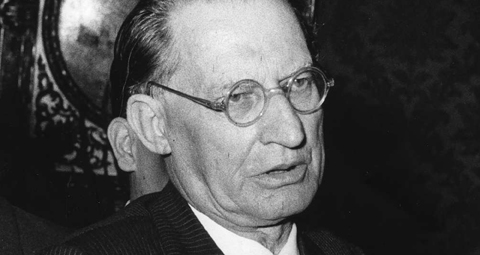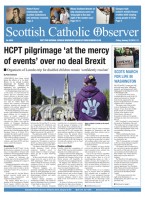January 25 | ![]() 0 COMMENTS
0 COMMENTS ![]() print
print

The EU can be reformed by going back to its Catholic roots
Ross Ahlfeld argues that the founding ideals of the European project can be re-established
In last week’s SCO, James Bundy laid out his rationale for backing Brexit and it is indeed important that we consider and debate the full range of political opinions from across the full spectrum of Scottish Catholicism—we are of course a broad Church.
Yet, while there is no single Christian position on Brexit, you could perhaps be forgiven for thinking that ‘Leave’ was the default position of Christians in the UK, especially if, like me, you happen to be a regular reader of certain Christian blogs.
To my mind, three of the most thought provoking bloggers are Canon Giles Fraser, the ‘Archbishop Cranmer’ blog and Rev David Robertson of the Scottish Free Church’s ‘Wee Flea’ blog—all three Brexit-supporters.
These writers aren’t afraid to engage in politics or state an overtly political opinion—a refreshing change, since most other Christian writers tend to be somewhat cagey when it comes to the cut and thrust of political discourse.
However, regular readers will notice that some Brexit-supporting Christian bloggers tend to define support for continuing EU membership as being part of the dreaded ‘metropolitan liberal elite.’
For me however, if you want ‘metropolitan liberal elites’ then maybe look at the ‘Young Turks’ from Cambridge Analytica who did so much for success of the Leave Campaign with their widely criticised mining of social media data. Similarly, for an example of ‘liberal’ or neoliberal’ policies look to the Conservative UK Government, who have always been entirely devoted Laissez-faire economics, and still are.
As the Anglican philosopher and theologian John Milbank recently pointed out, ‘We are the most neoliberal country in Europe and it is in part we ourselves who have pushed the EU in a more neoliberal direction.’
There is a also a strong Christian moral argument to be made for conserving EU legislation which protects workers’ rights, the environment, public health and safety and human rights.
Those who claim that these law are just all just EU ‘red tape’ are simply offering the same kind of deregulated future, which will lead us towards a society of substandard housing and poor working conditions. Theresa May for example, will consider axeing the Human Rights Act after Brexit.
More so, it was EU funding which helped sustain and mitigate the worst affects of economic decline in many post-industrial Scottish communities. This is especially true of my own former shipbuilding community which was left desolated by the worst excesses of Thatcherism and the growth of the so-called global market, which took so many manufacturing jobs away.
Most importantly, the European community was established by noble Catholic social thinkers and politicians such as Konrad Adenauer, Alcide De Gasperi and Robert Schuman.
These men built a post-war Europe on the principles of Catholic social thought. De Gasperi felt that the restoration of Christian ideals was the only way to prevent anything like the Second World War happening in Europe again.
Alcide de Gasperi was a devout Catholic, as was saintly Robert Schuman and also the heroic German chancellor Konrad Adenauer.
These statesmen believed passionately in the Catholic social teaching of subsidiarity: a principle which originated in the 1891 encyclical Rerum Novarum and claimed that policies are always best enacted at the most local level.
Sadly, in rejecting the principle of subsidiarity the EU has, in recent years, facilitated the handover of power to little groups of bureaucrats who are quite hostile to sovereignty and local cultural values.
Yet, in my opinion, this shouldn’t mean that we abandon our own European Christian Democratic heritage.
It was really the Maastricht Treaty in the 1990s which drastically altered the original idea of Europe in favour of business and capitalism.
These changes somewhat departed from de Gasperi’s vision. Maastricht even switched the European Community’s title to the European Union; at this point it moved from being a community of nations all working alongside each other, to bureaucrats trying to dominate all the nations involved with one set of laws and customs.
At no point did Adenauer, Schuman or De Gasperi ever envision a European superstate based on the free movement of labour and capital at the expense of community, localism, culture, tradition and the very idea of place.
Worse, the Maastricht Treaty was a partial rejection of Catholic subsidiarity.
Similarly, some Christian scholars and academics identify Christian Democracy as having lost its dynamism sometime after the Second Vatican Council. This was at the time when the Vatican undertook a course of reconciliation with the modern, secular nation-state.
This major shift was then quickly followed by the EU moving away from the Christian Democratic ‘moralised market’ of Schuman, de Gasperi and Adenauer, towards a more Anglo-Saxon ‘dog-eat-dog’ model.
So yes, from a certain Christian perspective, the EU is indeed in need of some restoration. Yet, the best way for us to undertake this work, is by remaining within the EU alongside our brothers and sisters on the continent. It cannot be restored from the outside.
There are signs of hope. Annegret Kramp-Karrenbauer, who became leader of the Christian Democratic Union in Germany last month, is a sincere and devout Catholic who appears open to the reform of the EU. AKK (As she is known) also seems to be committed to subsidiarity and the full restoration of what we call the ‘social market’.
In Greenock, atop Lyle Hill, sits the imposing Cross of Lorraine Free French Memorial. This tribute to the Free French who fought during the Second World War illustrates our bond with the continent.
The Cross of Lorraine as the symbol of the Free French Forces was suggested by the great Georges Thierry d’Argenlieu, who picked the symbol to invoke the memory of St Joan of Arc, and who after the war would become a Discalced Carmelite friar.
Over in the east of Scotland meanwhile, the great Scottish Catholic writer Muriel Spark would describe her Edinburgh hometown as a European city. As Miss Jean Brodie tells her girls, ‘We of Edinburgh owe a lot to the French. We are Europeans!’










